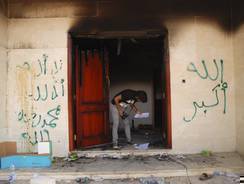
CAIRO -- Days of planning and online promotion by hard-line Islamist leaders helped whip up the mobs that stormed the U.S. Embassy in Egypt and launched a deadly attack on the U.S. Embassy in Libya that killed an ambassador and three others.
As the U.S. tightened security worldwide at embassies and Libya's president apologized for the attack, details emerged of how the violence began, according to experts who monitor Egyptian media.
Christopher Stevens, 52, the U.S. ambassador to Libya, was killed, along with three other Americans, on Tuesday night when a mob of protesters and gunmen stormed the embassy in the eastern city of Benghazi.
In response, the Obama administration sent an anti-terrorism detail of Marines to reinforce security at U.S. diplomatic facilities, and the Pentagon said two warships were moving toward the Libyan coast.
The killings in Libya followed demonstrations in front of Cairo's U.S. Embassy, where protesters tore down the U.S. flag and scaled the embassy's wall.
The protest was planned by Salafists well before news circulated of an objectionable video ridiculing Islam's prophet, Mohammed, said Eric Trager, an expert at the Washington Institute for Near East Policy.
The protest outside the U.S. Embassy in Cairo was announced Aug. 30 by Jamaa Islamiya, a State Department-designated terrorist group, to protest the ongoing imprisonment of its spiritual leader, Sheikh Omar abdel Rahman. He is serving a life sentence in the 1993 bombing of the World Trade Center.
When the video started circulating, Nader Bakkar, the spokesman for the Egyptian Salafist Noor party, which holds about 25% of the seats in parliament, called on people to go to the embassy. He also called on non-Islamist soccer hooligans, known as Ultras, to join the protest.
On Monday, the brother of al-Qaeda leader Ayman al Zawahiri, Mohamed al Zawahiri, tweeted that people should go to the embassy and "defend the prophet," Trager said.
Zawahiri justified al-Qaeda's 9/11 attacks in an interview with Al Jazeera last month.
"If America attacks the Arab peoples and their regimes do not defend them, somebody who does defend the Arab and Muslim peoples should not be considered a criminal," Zawahiri told the television network, according to a translation by MEMRI. "We have done nothing wrong."
A U.S. official, speaking to the Associated Press on condition of anonymity because he was not authorized to discuss the situation publicly, said the Obama administration is investigating whether the assault on the U.S. consulate in Libya was planned to mark the anniversary of 9/11.
The State Department identified one of the other Americans as Sean Smith, a foreign service information management officer. The identities of the others were being withheld pending notification of next of kin.
A senior administrations official -- who briefed reporters on the details but requested anonymity because he was not authorized to speak publicly -- describe the assault as an intense hours-long firefight between heavily armed gunmen and U.S. and Libyan security personnel attempting to defend the diplomatic mission.
This is the official's story:
Stevens was on a routine visit to the consulate in Benghazi when the compound came under fire from unidentified gunmen. In 15 minutes the gunmen gained access to the compound.
Stevens was in the building with Smith. About 45 minutes into the battle U.S. security personnel assigned to a nearby security annex attempted unsuccessfully to fight their way into the building but were driven off. More than 30 minutes later U.S. and Libyan security personnel tried again and were able to get into the main building. They rescued the remaining staff and hustled them to the nearby annex.
Soon after, the annex came under fire in a battle that lasted two hours. After the fighting died down, Stevens was brought to a Benghazi hospital. His body was later turned over to the Americans at Benghazi airport.
The Muslim Brotherhood on Wednesday condemned the violence.



